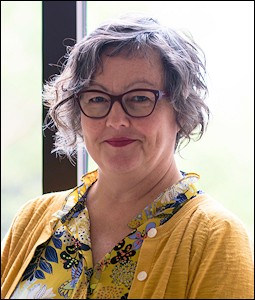Department of English Language and Literature
Directory
Susan Courtney
| Title: | Professor and Chair |
| Department: | English Language and Literature McCausland College of Arts and Sciences |
| Email: | courtney@sc.edu |
| Phone: | 803-777-7120 |
| Office: | HUO, Room 109 |
| Resources: | Film and Media Studies Program English Language and Literature |

Education
PhD, Rhetoric, University of California, Berkeley
Specialization
- U.S. film and media history
- film and media theory
- critical race studies
- gender studies
- American studies
Courses
- Film and Media Analysis
- Film and Media History
- Mediating Race
- The South on Screen
- Alternative Media/Alternative Communities
- Hollywood in the 1950s & 1960s
- Cowboy Nation: The American West in the Popular Imagination
- The Musical
- Race and Media Studies
Accolades
- Best Moving Image Book Award for Split Screen Nation, Kraszna-Krausz Foundation, 2018
- Provost’s Humanities Grant, 2018
- Two Thumbs Up Award, Office of Student Disability Services, University of South Carolina, 2016
- Research Professorship, Department of English, University of South Carolina, 2012
- Obert C. and Grace A. Tanner Visiting Research Fellow, Tanner Humanities Center, University of Utah, Salt Lake City, 2010-11
- Provost’s Arts and Humanities Grant, University of South Carolina, 2010
- Associate Professor Professional Development Award, College of Arts and Sciences, USC, 2009
- Josephine Abney Award, Women’s Studies Program, University of South Carolina, 2005
- Outstanding Professor Award, NADA International Student Residence, USC, 2000
Research
As a scholar of U.S. film and media, I’m interested in what media history can teach us about our histories and fictions of race, gender, region, and the nation itself. I have long been interested, especially, in how media shapes collective forms of racial knowledge and memory; but my archives have considerably shifted.
My first book, Hollywood Fantasies of Miscegenation: Spectacular Narratives of Gender and Race, 1903-1967, investigated popular cinema’s treatment of what it called “miscegenation”—before, during, and after the Production Code defined it as “sex relationship[s] between the black and white races” and forbade it on the big screen.
My most recent book, Split Screen Nation: Moving Images of the American West and South, considers how the history of divided feelings about the United States and its most paradoxical narratives (e.g., “land of the free”/land of slavery, conquest, and segregation) animates a persistent if unstable opposition in the history of U.S. screen culture between the West and the South. Split Screen Nation traces this opposition across a wide range of screen media in the era of Civil Rights and the Cold War, including Hollywood films and television, but also corporate and educational films, amateur films (aka “home movies”), and films of atomic testing in the desert West.
I am currently writing a book entitled ZIP Code Media: Audio-Visual Archives of Segregation and Its Aftermath. Inspired in part by contemporary citizen-media archives of systemic injustice (e.g., viral videos of police brutality), ZIP Code Media investigates the media history of U.S. institutions that helped make race in the 20th century. Chapters consider, for example, redlining maps made and disseminated by the federal government; the photographic collection of a Jim Crow state park system; and the multimedia projects of a municipal urban renewal agency. The book’s investigation of these archival materials aims to (1) explain how they originally emerged, circulated, and were used; and (2) repurpose them for the present, as powerful tools for expanding our ways of seeing, knowing, and responding to our collective histories of institutional racism.
Publications
BOOKS
- Split Screen Nation: Moving Images of the American West and South (Oxford UP, 2017)
- Hollywood Fantasies of Miscegenation: Spectacular Narratives of Gender and Race, 1903-1967 (Princeton UP, 2005)
SELECTED ESSAYS
- “Framing the Bomb in the West: the View from Lookout Mountain” in Haidee Wasson and Lee Grieveson, eds., Cinema's Military Industrial Complex (University of California Press, 2018)
- “From Colormuteness to Interracial Dialogue (A Love Letter to My MF Students),” Flow, vol. 23, no. 6, April 24, 2017
- “A Pedagogical Experiment in the Era of Black Lives Matter,” Flow, vol. 23, no. 4, February 26, 2017
- “Mediating Ferguson in Columbia, SC,” Flow, vol. 23, no. 2, November 20, 2016
- "Ripping the Portieres at the Seams: Lessons from Streetcar on Gone with the Wind" in J. E. Smyth, ed., American Historical Cinema in the Studio Era (Palgrave Macmillan, 2011)
- "Guess Who's Coming to Dinner with Eldridge Cleaver and the Supreme Court" in Daniel Bernardi, ed., The Persistence of Whiteness (Routledge, 2008)